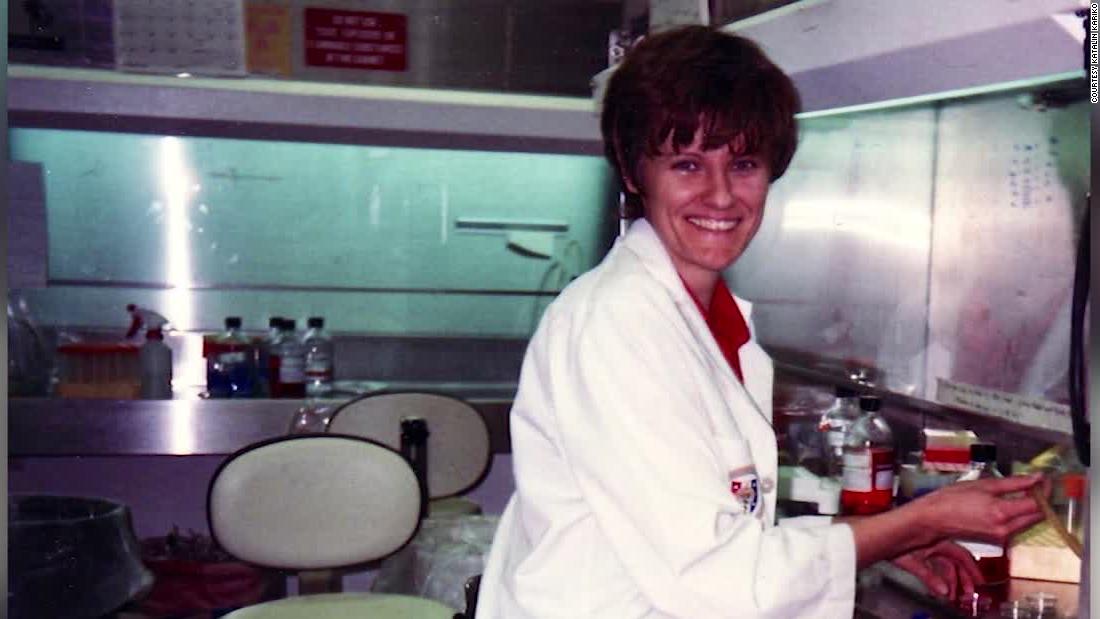
Karikó has spent decades of her career researching the therapeutic possibilities of mRNA, a component of DNA that is considered to be one of the main building blocks of life. Through multiple setbacks, job losses, doubt and a transatlantic move, Karikó stood by her conviction: That mRNA could be used for something truly groundbreaking. Now, that work is the basis of the Covid-19 vaccine.
From Hungary to the US
Karikó, 65, began her career in her native Hungary in the 1970s, when mRNA research was new and the possibilities seemed endless. But the call of the American dream (and more researching and funding opportunities) took root.
In 1985, she and her husband and young daughter left Hungary for the US after she got an invitation from Temple University in Philadelphia. They sold their car, Karikó told The Guardian, and stuffed the money -- an equivalent of about $1,200 -- in their daughter's teddy bear for safekeeping.
"We had just moved into our new apartment, our daughter was 2 years old, everything was so good, we were happy," Karikó told the Hungarian news site G7 of her family's departure. "But we had to go."
She continued her research at Temple, and then at the University of Pennsylvania's School of Medicine. But by then, the bloom was off the rose of mRNA research, and Karikó's idea that it could be used to fight disease was deemed too radical, too financially risky to fund. She applied for grant after grant, but kept getting rejections, and in 1995, she was demoted from her position at UPenn. She also was diagnosed with cancer around the same time.
"Usually, at that point, people just say goodbye and leave because it's so horrible," she told Stat, a health news site, in November. "I thought of going somewhere else, or doing something else. I also thought maybe I'm not good enough, not smart enough."
From doubt to breakthrough
But she stuck with it.
Eventually, Karikó and her former colleague at the University of Pennsylvania, Drew Weissman, developed a method of utilizing synthetic mRNA to fight disease that involves changing the way the body produces virus-fighting material, she explained on CNN's "Cuomo Prime Time."
That discovery is now the basis of the Covid-19 vaccine, and some have said both Weissman and Karikó, now a senior vice president of the Germany-based BioNTech, deserve a Nobel Prize.
"If anyone asks me whom to vote for some day down the line, I would put them front and center," Derek Rossi, one of the founders of pharmaceutical giant Moderna, told Stat. "That fundamental discovery is going to go into medicines that help the world."
While recognition, after all of this time, must be nice, Karikó says scientific glory isn't what's on her mind right now.
"Really, we will celebrate when this human suffering is over, when the hardship and all of this terrible time will end, and hopefully in the summer when we will forget about virus and vaccine. And then I will be really celebrating," she told CNN's Chris Cuomo.
Karikó said she plans to get the vaccine soon, along with Weissman, and she said she's "very, very confident" it will work. After all, it was their discoveries that contributed to it.
In the meantime, Karikó said she allowed herself a little treat to celebrate the vaccine news: a bag of Goobers, her favorite candy.
https://ift.tt/2Wowvf2
Business
Bagikan Berita Ini














0 Response to "She was demoted, doubted and rejected. Now, her work is the basis of the Covid-19 vaccine - CNN"
Post a Comment